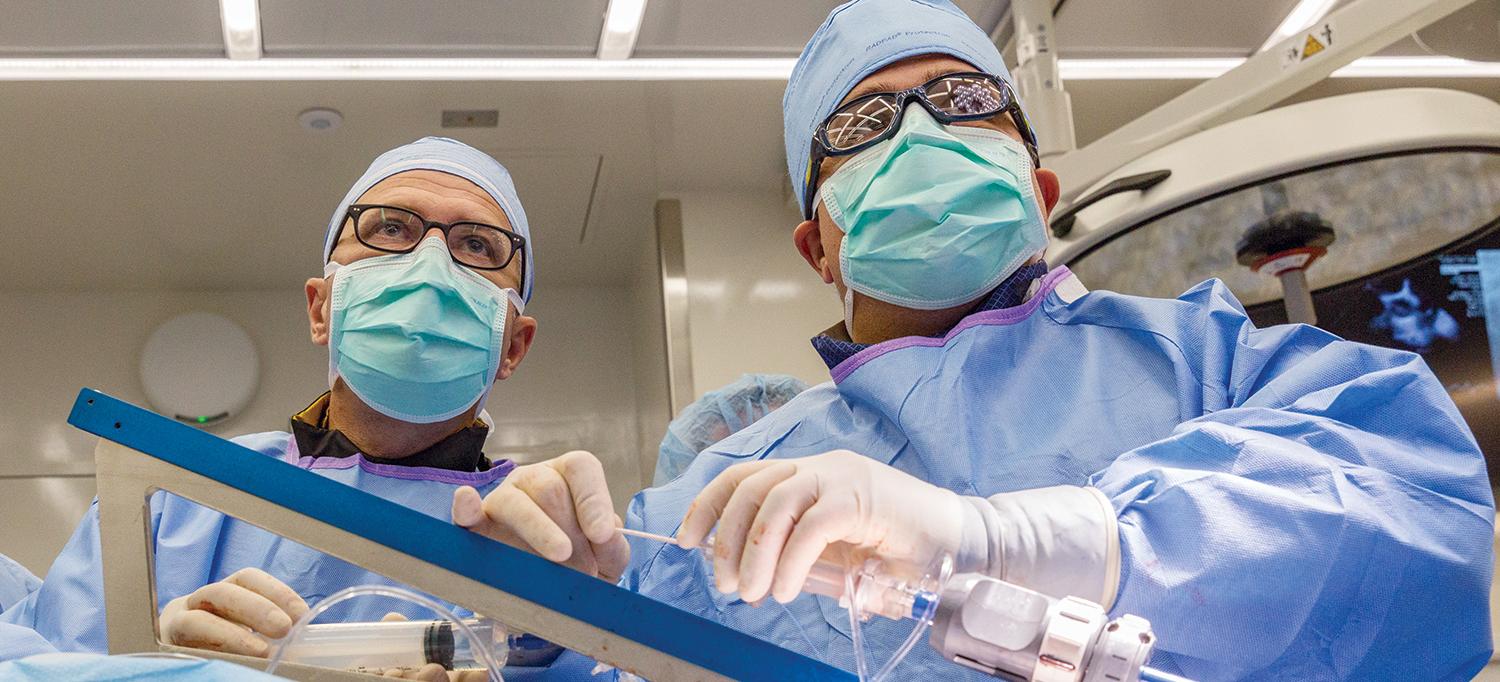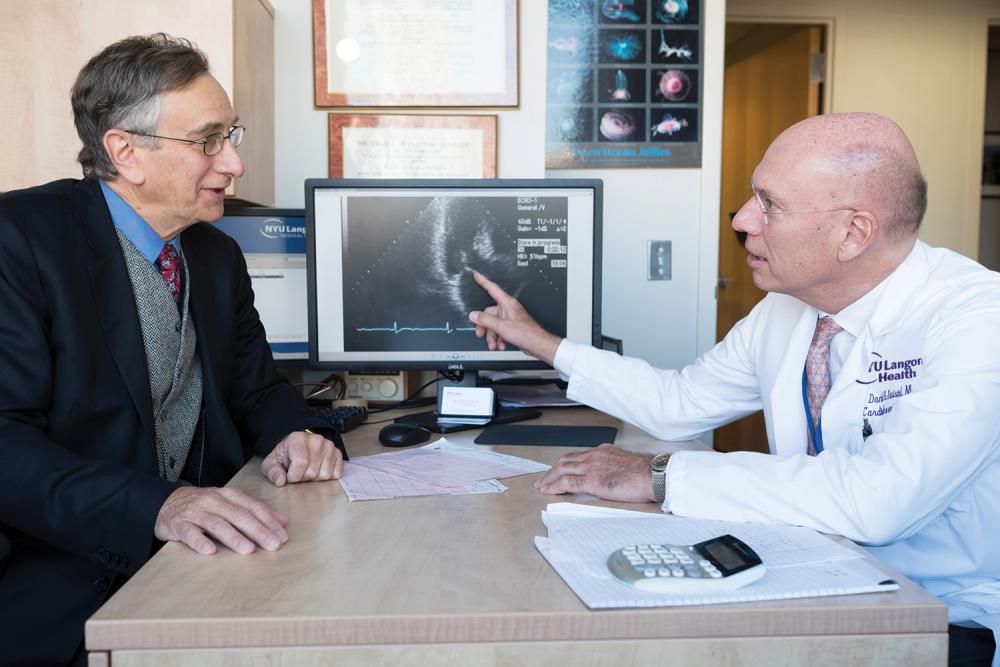
Cezar S. Staniloae, MD, and Mathew R. Williams, MD
PHOTO: BUD GLICK
With over a dozen trials under way, NYU Langone surgeons, international leaders in the transcatheter replacement of aortic and mitral valves, have performed the first in-human procedure in a number of implants with new valve replacement systems.
Through this work, these devices have been approved for widespread use, and their adoption is increasing, with total patient volume at the center up by 40 percent in 2017.
Safety and Performance of TAVR System
One research pathway is aimed at shedding light on the safety and performance of a new transcatheter aortic valve replacement (TAVR) system for patients with severe aortic stenosis deemed too high risk to undergo surgery. In June 2017, Mathew R. Williams, MD, associate professor of cardiothoracic surgery and medicine and chief of the Division of Adult Cardiac Surgery, performed the first implant of the
Meridian® Transcatheter Aortic Valve and Pathfinder®< II Delivery System, under investigation as part of HLT’s prospective, non-randomized, single-arm, multicenter RADIANT trial.
Another such trial has identified a potential treatment option for symptomatic patients with severe aortic stenosis at high or extreme risk for open heart surgery. Based on the results of the Evolut™ PRO clinical study, led by Dr. Williams, the U.S. Food and Drug Administration (FDA) this year approved the Medtronic CoreValve™ Evolut™ PRO TAVR system as a new valve replacement option for these patients. Outcomes are excellent: At 30 days post-procedure, patients were found to have a high survival rate, 98.3 percent, and a low rate of disabling stroke, 1.7 percent. “This innovation represents an important advantage over previous generations of this device, as it can help assist with adequate sealing even in complex cases,” notes Dr. Williams, who reported these results at the American College of Cardiology’s 66th Annual Scientific Session in March 2017.
The Heart Valve Center has also led the field in developing the transcatheter mitral valve replacement (TMVR)—offering all three systems currently on the market and holding half the world’s track record with one: the Caisson TMVR implant. In July 2016, Dr. Williams, who is also director of interventional cardiology and the Heart Valve Center, along with his team performed the world’s first transseptal transcatheter mitral valve replacements using the fully repositionable and retrievable implant, which enables proper placement and precise control at each step of the procedure. The three patients implanted by Dr. Williams are the first to be enrolled in the PRELUDE (Percutaneous Mitral Valve Replacement EvaLuation Utilizing IDE Early Feasibility) study, designed to provide initial safety and efficacy on the device to the FDA. Procedure time has been halved, with our experts now completing it in less than two hours.
New robotic approaches are also being uncovered in the center to facilitate complex mitral valve repairs, with more than 500 robotic repair procedures performed by the NYU Langone team to date using the novel da Vinci Xi® robotic surgical system. “As we build our body of experience using this device, we continue to fine-tune its application—always with the goal of completing mitral valve repair with the least invasive, most precise approach possible,” says Didier F. Loulmet, MD, associate professor of cardiothoracic surgery, director of robotic cardiac surgery, and chief of cardiac surgery.
Telehealth Innovations Promote At-Home Recovery
Regardless of the particulars of each mitral and aortic valve replacement case, the goal following the procedures is shared: early ambulation and discharge of the patient, as soon as possible. Approximately 80 percent of the center’s patients are discharged the day after their transcatheter procedure, compared with a national average of three days in the hospital. “In this population of patients, decreasing length of stay is especially important,” says Dr. Williams. “If you keep them in bed an extra day, you set them back an extra week.”
An advanced telehealth program using a smartphone-enabled system allows heart valve patients to be carefully monitored once home. At least 300 aortic and mitral valve replacement patients a year are discharged from NYU Langone with this system, which monitors indicators such as blood oxygenation and body weight and feeds the numbers directly to the heart valve team. “We can do things such as change medications and dosages remotely, which keeps the patient at home and eliminates return visits to the hospital,” says Dr. Williams.
Similarly, the experts at the center work jointly with cardiology, radiology, and others to limit the number of hospital appointments patients require before undergoing their procedure. “Overall, as our technologies become more advanced, our interdisciplinary clinic strives to make the process itself as low-impact as possible for our patients,” adds Dr. Williams.
An Expanding Suite of Treatment Options for Hypertrophic Cardiomyopathy
The Hypertrophic Cardiomyopathy Program at NYU Langone is one of the nation’s largest such programs offering both medical and surgical treatment for this genetic disorder, which results in abnormal thickening of the heart muscle. Advanced care for the condition is delivered under the leadership of medical director and cardiologist Mark V. Sherrid, MD, who is also a professor of medicine, and surgical director Daniel G. Swistel, MD, an associate professor of cardiothoracic surgery, both innovators in their field with more than 30 years of experience treating it. The range of leading-edge therapies they provide in partnership with interventional cardiologist Louai Razzouk, MD, MPH, assistant professor of medicine, now includes alcohol septal ablation. The minimally invasive procedure employs highly concentrated alcohol inserted through a catheter into an artery near the heart’s enlarged septum, producing thinner, less obstructive scar tissue that improves blood flow.


